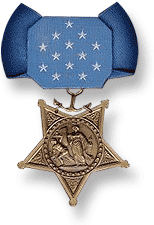Xipe Totec
Xipe Totec's JournalThe Story of Freddy Gonzales
Alfredo Cantu "Freddy" Gonzalez (May 23, 1946 – February 4, 1968) was a United States Marine Corps sergeant who posthumously received the Medal of Honor for service in the Battle of Huế during the Vietnam War.


Rank and organization: Sergeant, U.S. Marine Corps, Company A, 1st Battalion, 1st Marines, 1st Marine Division (Rein), FMF.
Place and date: Near Thua Thien, Republic of Vietnam, 4 February 1968.
Entered service at: San Antonio, Tex. Born: 23 May 1946, Edinburg Tex. Citation:
For conspicuous gallantry and intrepidity at the risk of his life above and beyond the call of duty while serving as platoon commander, 3d Platoon, Company A. On 31 January 1968, during the initial phase of Operation Hue City, Sgt. Gonzalez' unit was formed as a reaction force and deployed to Hue to relieve the pressure on the beleaguered city. While moving by truck convoy along Route No. 1, near the village of Lang Van Lrong, the Marines received a heavy volume of enemy fire. Sgt. Gonzalez aggressively maneuvered the Marines in his platoon, and directed their fire until the area was cleared of snipers. Immediately after crossing a river south of Hue, the column was again hit by intense enemy fire. One of the Marines on top of a tank was wounded and fell to the ground in an exposed position. With complete disregard for his safety, Sgt. Gonzalez ran through the fire-swept area to the assistance of his injured comrade. He lifted him up and though receiving fragmentation wounds during the rescue, he carried the wounded Marine to a covered position for treatment. Due to the increased volume and accuracy of enemy fire from a fortified machine gun bunker on the side of the road, the company was temporarily halted. Realizing the gravity of the situation, Sgt. Gonzalez exposed himself to the enemy fire and moved his platoon along the east side of a bordering rice paddy to a dike directly across from the bunker. Though fully aware of the danger involved, he moved to the fire-swept road and destroyed the hostile position with hand grenades. Although seriously wounded again on 3 February, he steadfastly refused medical treatment and continued to supervise his men and lead the attack. On 4 February, the enemy had again pinned the company down, inflicting heavy casualties with automatic weapons and rocket fire. Sgt. Gonzalez, utilizing a number of light antitank assault weapons, fearlessly moved from position to position firing numerous rounds at the heavily fortified enemy emplacements. He successfully knocked out a rocket position and suppressed much of the enemy fire before falling mortally wounded. The heroism, courage, and dynamic leadership displayed by Sgt. Gonzalez reflected great credit upon himself and the Marine Corps, and were in keeping with the highest traditions of the U.S. Naval Service. He gallantly gave his life for his country.
https://en.wikipedia.org/wiki/Alfredo_Cantu_Gonzalez
Suffolk Resolves
The Suffolk Resolves was a declaration made on September 9, 1774 by the leaders of Suffolk County, Massachusetts, of which Boston is the major city. The declaration rejected the Massachusetts Government Act and resolved on a boycott of imported goods from Britain unless the Intolerable Acts were repealed. The Resolves were recognized by statesman Edmund Burke as a major development in colonial animosity leading to adoption of the United States Declaration of Independence from the Kingdom of Great Britain in 1776, and he urged British conciliation with the American colonies, to little effect. The First Continental Congress endorsed the Resolves on September 17, 1774.
In one of his less famous rides, Paul Revere delivered a copy of the Resolves to the First Continental Congress in Philadelphia, Pennsylvania, where it was endorsed on September 17 as a show of colonial solidarity. In response, John Adams commented in his diary: "This was one of the happiest days of my life. In Congress we had generous, noble sentiments, and manly eloquence. This day convinced me that America will support Massachusetts or perish with her".
https://en.wikipedia.org/wiki/Suffolk_Resolves
A historic plaque on Adams Street in the Lower Mills area of Milton commemorates the original site of the Daniel Vose House, where the Suffolk Resolves were signed on September 4, 1774. In order to prevent its demolition, the house was moved in 1950 from Lower Mills to 1370 Canton Avenue in Milton. Now known as the Suffolk Resolves House, it was restored to its original colonial appearance and is the headquarters of the Milton Historical Society. It was added to the National Register of Historic Places in 1973 and is open to public view.
For many years I lived in Milton, within walking distance of both of these famous locations.

Profile Information
Gender: Do not displayCurrent location: The Republic of Texas
Member since: Thu Apr 8, 2004, 06:04 PM
Number of posts: 43,890